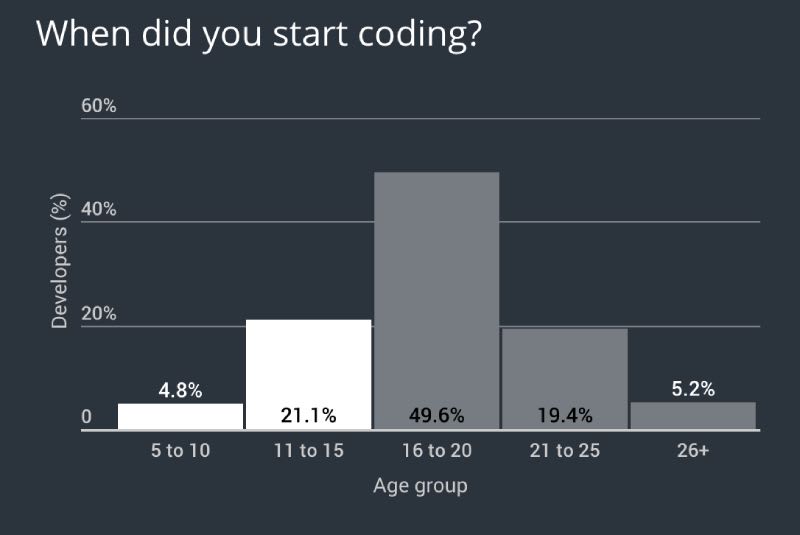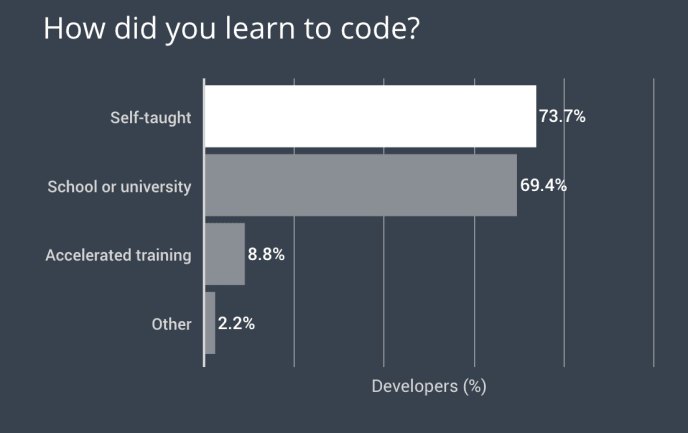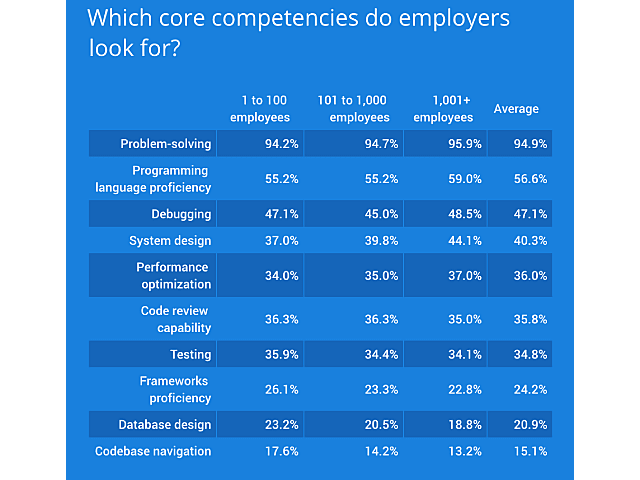2018 Developer Skills Report provided by HackerRank.
Table of Contents
2018 Developer Skills Report – Learning & Education

1 in 4 developers started coding before they could drive.
It’s never too early — or too late! — to start coding. Of the roughly 39,000 developers surveyed across all professional levels, more than a quarter of developers wrote their first piece of code before they were 16 years old.
Meanwhile, of all the developers who started coding after the age of 26, 36% are now senior or even higher-level developers, growing quickly in their careers.
The PC revolution sparked a unique ambition among ‘70s kids
Unlike generations thereafter, if kids of the seventies wanted to see innovative technology, they’d have to build it themselves — they had no other choice.
There were no widespread resources to teach them how to build software. Almost half of all developers (47%) between the ages of 45 and 54 started coding before they were 16 years old.
Meanwhile, developers between 18 and 24 today are the least likely to have started coding before 16 (only 20%).
Developers between the ages of 45 and 54 were among the first to get their hands on relatively powerful PCs, like the Acorn Archimedes, TRS-80, Commodore 64, and Apple II.
With limited to no access to formal education, young people in the PC Revolution had an unusually strong drive to learn to code on their own.
Nearly all developers have an insatiable thirst for learning
It seems like every year there’s a new hallmark programming language, framework or library that proliferates across developer blogs.

First, it was all about Backbone.js. Now, everyone is raving about AngularJS and React. Self-teaching is the norm for developers of all ages. Even though 67% of developers have CS degrees, roughly 74% said they were at least partially self-taught.
On average, developers know 4 languages, and they want to learn 4 more. The degree of thirst for learning varies by generations — young developers between 18 and 24 plan to learn 6 languages, whereas folks older than 35 only plan to learn 3.
Since programming is centered on independent research aimed at solving new challenges, self-teaching is a major part of being a successful developer.
In choosing what to learn next, the best guiding principle is to plant yourself in one discipline and learn tools as a means to grow. Tools will always change.
Ultimately, it’s curiosity and genuine interest in programs that should fuel the drive to learn new tools and adapt to tech’s evolving landscape.
2018 Developer Skills Report: In Demand Skills
Even though new languages arise frequently, it’s most important for developers to master core, legacy languages.
Developers are learning the languages employers are looking for most.
Employers’ most common requirement today are:
The biggest gap in knowledge
is with JavaScript frameworks
Programming languages aren’t adopted in the industry as quickly as they are created, but JavaScript is changing the game with its frameworks.
A number of the most in-demand frameworks are JavaScript frameworks — it’s the only language versatile enough to build frontend, backend, mobile and browser extensions.
Hence, JavaScript is ruling the web. Most often, employers want developers who know AngularJS, Node.js, and React.
React has the biggest delta between percentage of developers who know the framework and percentage of employers who look for candidates with this skillset.
In other words, there’s a big opportunity for developers to learn React as a marketable skill that companies need today.
Almost all employers prioritize problem-solving skills first

Problem-solving skills are almost unanimously the most important qualification that employers look for….more than programming languages proficiency, debugging, and system design.
Demonstrating computational thinking or the ability to break down large, complex problems is just as valuable (if not more so) than the baseline technical skills required for a job.
What you do matters more than what’s on your resume
There’s a popular belief that recruiters favor candidates with CS degrees from prestigious universities. But it turns out that they actually care about what you’ve done — not where you went to school. An overwhelming majority of hiring managers said they look for proven skill, such as previous work, years of experience, and projects/GitHub.
Regardless of company size, 9 out of 10 hiring managers say previous experience and years of experience — both indicators of skill — are among the most popular qualifications.
What you do matters more than anything else. Small companies place a higher value on the portfolio: 80% versus 66% of large companies.
Execs place the highest value portfolios and personal projects
Companies are looking at GitHub and projects to supplement resumes and evaluate skills better.
When we filtered the data by roles, we found that those in a C-level positions, including founders, CTOs and VPs, valued GitHub projects more than years of experience.
Prestige of degree dropped even further in importance for these folks.

